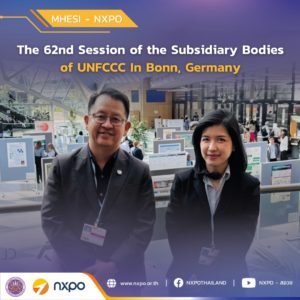NXPO recently hosted a special talk titled “The Next step to Overcome the COVID-19 Crisis”. The e-conference was held with guest speaker Dr. Kumnuan Ungchusak, an epidemiology expert of the Department of Disease Control sharing his opinion on health policy, guidelines and measures to control the spread of COVID-19, which restrictions should be maintained and which to be relaxed for businesses, education institutes and the public and under what conditions. The forum also discussed some permanent changes on the society, economy and education triggered by the pandemic and how to prepare for emerging and re-emerging diseases in the future.

Dr. Kumnuan expected to see work-from-home and social distancing lasting for at least 12-18 months. Although emerging disease outbreak can be anticipated every ten years, this cycle seems to be shortened lately and difficult to predict. The COVID-19 outbreak has been very rapid and aggressive, reaching a pandemic level within 3 months. Global cases have exceeded 4 million whilst worldwide death toll has hit approximately 290,000. Unlike SARS epidemic which lasted for 8 months, the COVID-19 will unlikely end anytime soon as countries have been unprepared for it and only followed preceding measures set by other countries that were hit prior. Only recently that each country reviewed preceding measures and modified them to fit with its own situation. For Thailand, social policy including social distancing and wearing facial masks were implemented on top of health policy once it became known that COVID-19 can spread from person to person even before symptoms start. Once the transmission become difficult to control, lockdown measures were introduced to flatten the curve. What the healthcare community would like to see from now on is low transmission where current healthcare infrastructure capacity can adequately meet the demand.
This crisis has introduced Thai to the new normal, and perhaps, in Dr. Kumnuan’s opinion, changed some social values for the better such as safety before fun and convenience, small but meaningful social gathering and embracing sufficiency economy philosophy.
As the country is easing the lockdown, a number of measures were suggested in the forum such as an international agreement on cross-border travelling and the use of technologies for COVID-19 screening and monitoring. On the question raised by NXPO President Dr. Kitipong Promwong about the human resource development program for village health volunteers (VHV), Dr. Kumnuan said that VHVs – which stand at 1 million volunteers throughout the country – were instrumental in the fight against COVID-19 and greatly reduced the burden of healthcare professionals. A similar model can be applied to the factories by having health volunteers among factory workers, especially foreign workers. This health volunteers will need some training before assuming their role.
Another issue raised in the forum was the school opening scheduled on 1 July. Dr. Kumnuan felt that the timing is appropriate as it will not coincide with the seasonal occurrence of influenza in June. Among proper measures should be implemented are asking teachers and students to wear facial masks and minimizing verbal communication during classroom sessions as well as in social settings. The meeting also discussed the potential of Thailand becoming a regional hub for vaccine production, as the country has been praised for its effective COVID-19 control management.
Information collected from this forum will be used by NXPO to revise the Higher Education, Science, Research and Innovation Policy and Strategy and by research funding agencies to design their funding programs accordingly.







